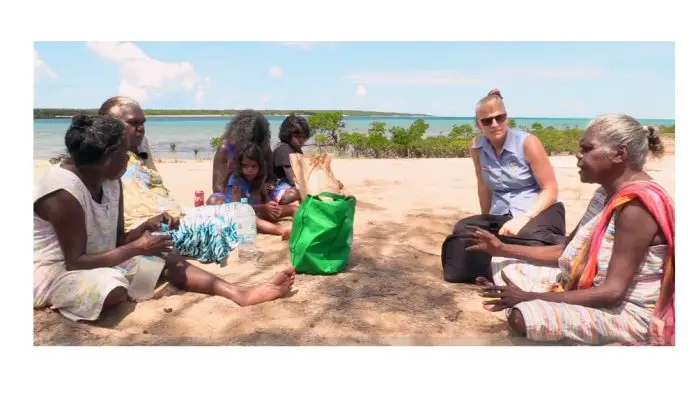A small community in the Northern Territory is changing the way in which death is discussed and ensuring the dying wishes of its people are followed.
For the Indigenous people living on Groote Eylandt, advance care plans have become far more than care directives for the final stages of death; they are giving people greater power and control over their lives.
“Rather than talking about [death] in a doom and gloom setting, we talk about it in way that empowers people, that encourages them to put as much effort into their final days and the death and dying process as we do into birth,” said Jenni Langrell, Registered Nurse, Midwife and Primary Health Care Manager at Angurugu and Milyakburra Health Centres, NT.
“End of life is a time that should be celebrated, we should encourage people to have control right to the very end. But have provisions in place so that if, all of a sudden, they don’t have control because they are so unwell, they have already given us those instructions and we’ve written them down and know what to do.”
“On Groote we refer to [advance care plans] as a ‘jura’ which means ‘paper’. A jura isn’t only used for people with terminal illness or a chronic disease, it’s also created for people who are well but want to be able to get their orders or instructions written down while they are well,” Jenni said.
With a senior population expected to nearly triple in the next 15 years and five per cent of the island’s residents estimated to be at risk of or suffer from Machado-Joseph Disease, also known as ‘locked-in syndrome’, advance care plans are extremely helpful to health workers and family members wanting to respect a person’s cultural beliefs and family connections.
The team behind advance care planning on Groote Eylandt spoke about their work on a panel at the Oceanic Palliative Care Conference last Friday.
“I think sometimes death has been medicalised so much that we’ve forgotten that people were dying well before there was a medical system,” said Jonathan Jauncey, NT Manager for the Program of Experience in Palliative Approach (PEPA).
“To have this form that can mesh it all together keeps our people strong, it keeps our spirit strong, and it keeps the country and the land strong.”
“For the majority of Aboriginal people we see coming in, a big priority is returning to country whether that be prior to finishing up or ensuring that our body can return to country,” Jon said.
“Going ‘back to country’ is a major thing for our people in terms of keeping our culture strong. In those final days being able to pass on culture to the next generation, the same information that’s been passed down for generation and generation.”
“The first thing is to understand our religious or spiritual beliefs around returning to country. For traditional Aboriginal people, our god is the country. We come from the country and one day we return to the country. We don’t own the country, the country owns us.”
“Our connection to the country is not just spiritual thing, it’s a physical thing as well. The country talks to us, it guides us.”
“A different outlook for us is when our people pass away, they don’t go upstairs or downstairs, they go to be part of the country.”
“When we think about grief and loss, we don’t necessarily loose our people, as they just return to the part of country where they are
“When we’re not well we belong to the country, the country decides whether it’s time to keep us or if it’s time to prepare us for the next part of our journey.”
“At the end of the day the advance care plan is ensuring people’s wishes are being fulfilled, their choices and their wishes in so many different realms,” Jon said.
Despite a high prevalence of chronic disease, end of life care and the dying process was not being discussed openly, creating challenges for family members and health workers.
That changed when people began receiving palliative care and chose to return to the community to die.
“Since we’ve had sick people come back to the community and now it’s talked about,” said Helen Lalara, a Senior Aboriginal Health Practitioner and Senior Anindilyakwa woman from Angurugu, NT.
Helen has been working at the health service since 1988 and is integral in the program’s success.
“I love doing it because for my people and my community, death is not a frightening thing, it’s just like when you come into this world you get reborn, and as you go it’s the same.”
“If a person who is sick is away from home and wants to come back and die here, we respect that. This is where they belong, this is the country they were born and grew up here,” Helen said.
Having an advance care plan done before a person becomes unwell or too advance in their illness is also helping to relieve pressure on family members where relationships can be complex.
“At the end of the day you don’t want to have people arguing over where you are going to get buried, who are the family members … what and where, you know?” said Jenni.
“Everything is written down from that person’s mouth onto the piece of paper and that’s it. And if they want to change it they can. It gives that person the power to say everything they want before they go.”
In discussing the clinical care aspects of palliative care, Jenni and Helen ensure people understand their options and know what medical interventions involve, or give people the option of health workers “show respect”, a cultural term which means no medical intervention.
The connections between Jenni, Helen, the health care team and the wider community has been pivotal in the success of advance care planning on Groote.
“Helen knows the right way for us to work as clinic staff as do the other local staff,” Jenni said.
“There’s often tricky cultural things, family things that I need to go to Helen for guidance and support or she will come to me and say to us ‘you need to do this differently’.”
What is happening on Groote in terms of advance care planning is extraordinary, and the team have produced a short documentary about how they are working with the community to increase advance care planning to help others.
The high use of advance care plans has made it easier for hospital staff too, as many people are transferred to Gove or Darwin for medical treatment.
“When patients are transferred to Darwin and already have an advance care plan in place, the medical team know that it was done in the right setting with the right amount of time, with healthcare workers who they know and trust, and particularly important with the right family members and community members involved in that decision,” said Dr Niamh O’Connor Specialist, Territory Palliative Care.
Watch the documentary “Finishing Up”:










